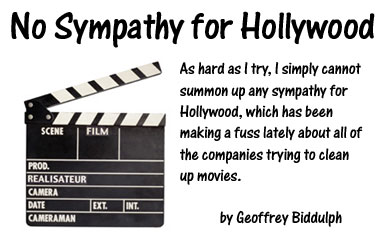
No Sympathy for Hollywood
by Geoffrey Biddulph
As hard as I try, I simply cannot summon up any sympathy for Hollywood, which has been making a fuss lately about all of the companies trying to clean up movies.
You have probably heard of companies like CleanFlicks or MovieMask, which make products to clean up the foul messages in today’s movies. Hollywood heavyweights have filed suit against some of these companies because they’re interfering with directors’ “art.”
Stop and think for a second how absurd this is: For about the first 40 years of the movie business, you could go to a film without having to see any sex or violence or anything objectionable to young children. Then the movie business decided it wasn’t “artistic” to adopt these limits. These days, the movie business has descended to appealing to the worst of human nature in the hopes of allowing its directors to be “artistic” and at the same time earn some big bucks.
But surprise: the most popular movies are also the ones that have the least objectionable material to families. This is common sense, because if you make a family-friendly film chances are mom and dad will take their kids too, and, what do you know, three or four or five tickets brings in more revenue than two tickets. Still, year after year, Hollywood refuses to recognize this and continues to churn out garbage in the name of “art.”
So a few small companies are letting the free market do its magic. They are taking films and deleting the bad words, nudity, sex scenes and extreme violence and then reselling the clean movies to the public. And they are having tremendous success.
Let’s see how many Meridian readers find this scene familiar: you’re watching a PG or PG-13 rated movie with your children about, say, horses. All of a sudden, the hero says an R-rated word. And then the two main characters, who are not married, start having R-rated interactions. You run to the VCR or try to find the stop button on the remote, but it’s too late. Your kids have already had imprinted on their young minds the R-rated words and actions. You can’t erase them, and your kids have completely forgotten that the movie was about horses in the first place.
It’s moments like these when I begin to have angry thoughts about Hollywood directors. The rest of the movie is fine, of course. There are only about two minutes of the entire movie that are objectionable. Why couldn’t they just leave those objectionable parts out in the first place, or at least offer to sell me a version of the movie without all the garbage?
So, when I heard about CleanFlicks and its ilk I was ecstatic. Finally, a company that understands my needs! No more surprises during movie watching!
And, right on cue the big guys from Hollywood make it very clear they don’t want anybody watching clean movies. In Hollywood’s view, it’s either dirty movies, or no movies.
The Directors Guild of America has sued CleanFlicks claiming that it and other companies violate trademark law when they buy a new film, edit it and resell it.
Now, let me see if I get this right. CleanFlicks pays for a dirty film, cleans it up and resells it. Hollywood gets its money from the film. The film becomes CleanFlicks’ property once it buys it. But Hollywood believes it has the right to prevent CleanFlicks from doing whatever it wants with its own property. Cleanflicks is not copying the movie and reselling them, which clearly would be illegal. Everybody should be happy: the movie business gets its money for the video or DVD, and I get a clean movie. In fact, if anything, Hollywood should be ecstatic: CleanFlicks is helping it get revenue it would not otherwise get. There is no way I would buy most R-rated movies, but if a company like CleanFlicks has cleaned it up, chances are high I would.
Filmmakers say they can’t allow companies to alter its movies because in theory they could take a tame movie and make it even worse. They claim that soon Bambi would become pornographic. There’s only one problem with this argument: the demand for a pornographic Bambi is already being filled by all of the thousands of dirty movies already in the marketplace. The reason that CleanFlicks exists in the first place is that there is an unfulfilled demand for clean movies.
Hollywood has gotten itself into an awful mess. Not only is the movie industry saying we can only watch unfit movies, but it is saying it’s not interested in the extra revenue it could earn by allowing others to make its movies more family-friendly.
The suicidal behavior by Hollywood is even worse than it may appear: Hollywood already produces edited versions of many movies for television and airplane flights. Obviously, there’s a market for these cleaner versions of the films, and directors are not jumping out of tall buildings at the idea of their “art” being offended so their movies can be shown on television and airplanes. But these cleaner versions of the films are not widely available, so it doesn’t solve my home viewing problem.
So, here’s what modern-day culture has descended to:
A) Hollywood would rather lose money in the name of “art” than make movies that are family-friendly in the first place.
B) Even when Hollywood has recognized that there is a market for clean films (TV and airplanes), the movie business refuses to make these versions available.
C) When companies recognize there is a demand for clean films, Hollywood launches lawsuits to prevent companies from making filth-free movies, even when these companies are helping sell more movies and increase Hollywood revenues.
Go figure. No wonder they call Hollywood tinsel town. It’s a place of flim-flam reasoning.
2002Meridian Magazine. All Rights Reserved.

















